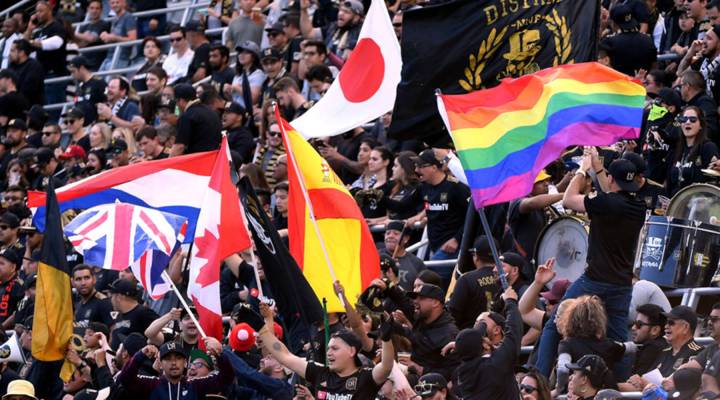
FIFA gets countries to bend laws all the time. Why nothing on LGBT laws in Russia?
FIFA gets countries to bend laws all the time. Why nothing on LGBT laws in Russia?

The 2018 World Cup — the largest international soccer tournament — begins in Russia on June 14. The massive international event attracts visitors and viewers from around the world, and FIFA, the group that runs international soccer, is tasked with making sure the World Cup keeps up certain standards, including human rights standards.
FIFA’s policy states that it has a policy of “zero tolerance for discrimination based on sexual orientation” — and that’s come up a lot in advance of this World Cup because of Russia’s “gay propaganda” law, which many see as a ban on promoting or acknowledging LGBT rights and culture.
Yuval Weber, a fellow at the Kennan Institute at the Wilson Center, joined Marketplace Weekend to explain how FIFA, Russia and World Cup sponsors interact to make rules.
Here’s the breakdown:
The host country already has laws in place
In the case of Russia, there are actually quite a few laws on the books that are at odds with FIFA’s mission to attract a large stadium audience and to uphold its human rights standards. In addition to the gay propaganda law, Russia has very strict requirements for tourists — most need a visa to visit. These issues present a challenge for FIFA, but not an insurmountable one.
FIFA can make host countries suspend their laws
Organizations like FIFA that host big international events have a lot of power — FIFA (and the International Olympic Committee) can use their influence to suspend or work around laws in the countries where they host games. In the case of Russia’s visa requirements, FIFA has a workaround: a ticket can be used as a visa. Yuval Weber says that the same goes for tax laws and labor laws, which FIFA can ask hosts to suspend in order to build stadiums and rake in the profits at the World Cup.
Corporate sponsors have a lot of clout, too
At past games, FIFA has used their law-changing power at the behest of major corporate sponsors. At the 2014 World Cup in Brazil, it was pressure from FIFA that made Brazil approve the sale of alcoholic beverages in soccer stadiums during the tournament. That pressure from FIFA was, perhaps unsurprisingly, sparked by pressure from Budweiser, a major sponsor of the World Cup.
So how about those human rights standards?

A rainbow flag flies before the Sky Bet Championship match between Barnsley and Leeds United at Oakwell Stadium on November 25, 2017 in Barnsley, England.
Yes, FIFA has exerted its power in the name of beer sales. But when it comes to the gay propaganda laws in Russia, they haven’t pushed for change. Instead, Russia has agreed to welcome and protect all visitors equally, and officials say LGBT fans visiting Russia won’t be arrested under the propaganda laws.
But anti-gay violence has increased in the five years since the laws were put in place, and LGBT fans have been warned by human rights groups that public displays of affection may not be safe.
Weber says that visitors can expect heightened police and military presence to prevent any violence, and English speaking volunteers stationed to help out. But although FIFA could have asked for a suspension of the gay propaganda laws across the board, they didn’t. Which brings us back to the corporate sponsors.
Western companies aren’t holding (all) the purse strings
“Private companies have a lot of money, and they can dictate quite a lot to sovereign governments,” Weber said. Sponsors of the 2018 games have expressed concerns about the Russia World Cup as well as the upcoming games in Qatar.
Many of the usual sponsors are taking a step back, reluctant to associate too closely with Russia or with FIFA itself. Those that do run ads will probably stick more to soccer than politics.
Corporate sponsors love a feel good story, and tend to focus on the positive. When the World Cup was held in South Africa in 2010, sponsors made a big effort to incorporate the end of apartheid into their advertising. Weber says that the same cannot be expected in these games. Sponsors are more likely to de-emphasize the Russia element and highlight the tournament’s big stars.
While some giants like Coca-Cola, McDonald’s and Budweiser are sticking around in 2018, many of the biggest sponsors of the 2018 game are Russian, Chinese and Middle Eastern companies. Gazprom, a Russia national gas business, Qatar Airways, and Chinese real estate firm Wanda Group all have top sponsorship spots.
Weber says that many of these newer sponsors are less concerned with voting with their dollar to change Russian laws and more concerned with “burnishing their soft power.”
What’s next?
The Russian games will be something of a test for FIFA and for sponsors. The 2022 World Cup will be held in Qatar, and FIFA is already fielding concerns about human rights standards there. Morocco, where homosexuality is a criminal offense, is still in the running to host the 2026 games.
There’s a lot happening in the world. Through it all, Marketplace is here for you.
You rely on Marketplace to break down the world’s events and tell you how it affects you in a fact-based, approachable way. We rely on your financial support to keep making that possible.
Your donation today powers the independent journalism that you rely on. For just $5/month, you can help sustain Marketplace so we can keep reporting on the things that matter to you.












